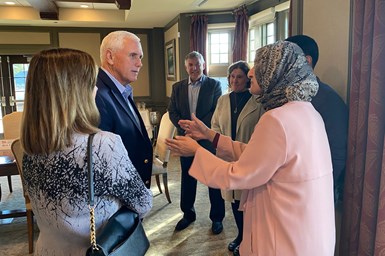Sharing the Manufacturing Narrative With Policymakers
Conversations with policymakers represent a chance to communicate our challenges, showcase our passion and impact them with our pride in American manufacturing.
Share





As CEO and co-owner of a precision manufacturing shop, I am responsible for the livelihood of my team and their families. Each of them in turn contributes to fulfilling our clients’ need for parts for the medical industry, as well as components for aerospace, defense and other time-sensitive industries.
This is not the place for politics.
But it is a place for opportunity — especially when I have a chance to connect with presidents and vice presidents. Red or blue does not matter to me when I am acting in the best interests of my business and the people who count on it. Given our scope, these people include patients, first-responders, doctors, pilots, customers and families. What right do I have to indulge in political grandstanding when I can instead take action to strengthen the industry?
Advocacy means getting the word out about manufacturing, not asking for handouts. Each rare opportunity to chat with a policymaker — whether national or local — represents a chance to communicate our challenges, showcase our passion and impact them with our pride in American manufacturing.
To that end, the best tactic is nothing less than simply sharing the narrative of the past two years. As a whole, we shifted production almost overnight into the making of critical medical supplies. If a missing gauge or similar component threatened a shop’s output, then one of its competitors sent a replacement so the supply chain would remain intact.
It’s unfortunate that we live in a time when business leaders feel pressured to hide any and all efforts to engage political leaders. If a business leader publicly and plainly endorses a particular candidate or party, then they best be ready for fallout. That said, appearing beside a public official does not necessarily equal endorsement.
My time with Vice President Pence was an opportunity to highlight the current state of American manufacturing. When President Biden recognized Pioneer Service during an address to the Muslim community, I shared the event because it was an opportunity to inspire other Muslim women to pursue leadership roles in manufacturing (and perhaps show off my business a bit).
I will not waste such opportunities to score political “points.” As CEO and diversity, equity and inclusion (DEI) advocate, there’s only one logical path, even and especially when it includes people from the other side of the aisle. America isn’t what it is today because we’ve always agreed. DEI isn’t about making everyone uniform; it’s about learning a little about the “other” person’s perspective so we can meet somewhere in the middle.
I do, of course, have political opinions, but as an advocate of diversity, refusing to engage someone because they think differently would also mark me as a hypocrite. The more uncomfortable the conversation, the greater the need to have it.
How many chances will I have to converse with a president or vice president? Whether with a mayor or the White House, making the most of such opportunities takes time and effort, as does creating them. I spent countless hours as an active member in the Precision Machined Products Association (PMPA), the Illinois Manufacturers’ Association (IMA) and the National Association of Manufacturers (NAM), which keeps me connected to major players in manufacturing who help make these meet-ups happen. They also coach me on talking points and back them up with research, providing me with manufacturing facts and stories that show how manufacturing is the backbone of our country.
Jay Timmons, NAM’s president and CEO, says, “Good (or bad) ideas don’t belong to any one party. We want to take the best of both. We need to engage both parties and instill in them our sense of urgency and excitement for this industry.”
Succeeding requires a refusal to feel intimidated by the stakes and players involved. Although the talking points are helpful guide rails, nothing shines like our stories. They will be remembered by that policymaker when they encounter a relevant piece of legislation, and they will be proud to advocate for our industry.
I say and write it often: Perfection is not a prerequisite. I’m thankful for that fact. I may not always be the most articulate, but I have a great team behind me, and the narrative speaks for itself.
And, when engaging the “other” side, those conversations can get messy — even heated — but we can’t forget to circle back around to empathy, respect and calm negotiation. I don’t have all the answers. I can only do my part.
And I will.
Read Next
Registration Now Open for the Precision Machining Technology Show (PMTS) 2025
The precision machining industry’s premier event returns to Cleveland, OH, April 1-3.
Read MoreBuilding Out a Foundation for Student Machinists
Autodesk and Haas have teamed up to produce an introductory course for students that covers the basics of CAD, CAM and CNC while providing them with a portfolio part.
Read More5 Rules of Thumb for Buying CNC Machine Tools
Use these tips to carefully plan your machine tool purchases and to avoid regretting your decision later.
Read More


























